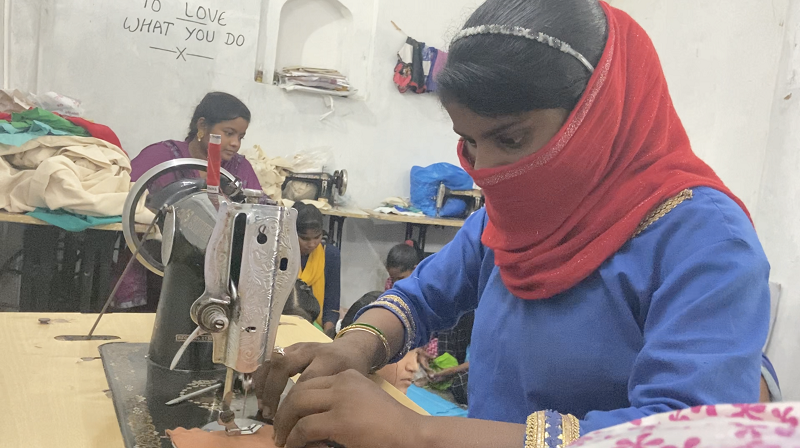
28th May is observed as World Menstrual Health Day. In this week's TypeRight, we look into some of the recent issues concerning menstrual health, data-fication of health, and some of DEF's work on the ground with communities.
Recently, concerns about the kind of data collected by a host of period tracking apps have hit the news again. Concerns have been raised on the amounts of data the companies have, and the privacy laws (or lack, thereof) are leading to this data being sold and later misused. Particularly, this is in the light of USA's recent consideration of overturning of Roe vs Wade judgement.
The judgement in question is a landmark ruling by the US Supreme Court in 1973 following a lawsuit that established constitutional right to abortion in the country. Before the judgement, abortion was broadly legal in just four states and allowed under limited circumstances in 16 others.
This is related to the menstrual apps and data, because the data that the period-tracker apps have contains a lot of sensitive details about one's health and sexuality. While this would have obvious advertising benefits, they can be sold and then be used, potentially, to penalise anyone seeking or considering an abortion. And there definitely is a history of private citizens reporting on others to get them punished or imprisoned.
While this is particularly concerning for the US in this particular backdrop, people in India have just as much reason to be concerned, given how we are already lacking a proper data protection bill, and the one which is in work is already coming under criticism. We had covered some of the issues of the bill in a previous chapter of TypeRight, or our friends at the Internet Freedom Foundation have also done a detailed report that could be checked out.
This news comes in the same week as World Menstrual Hygiene Day.
In 2014, a German NGO, WASH United, called for 28/5 to be observed as World Menstrual Health/Hygiene Day, given how menstruation has often and across places been associated with various types of stigmas, exclusions, and loss of rights, access and dignity to people who menstruate. Organisations such as the UN have later taken it up along with their other initiatives. It is observed on the twenty-eighth of May because menstrual cycles average 28 days in length and people menstruate an average of five days each month. The increased discussion is hoped to counter not just the stigma, but the economic effects- such as loss of work and employment, or the inability of people to afford menstrual supplies. As the official webpage for the day mentions, what is intended are these:
To break the taboos and end the stigma surrounding menstruation; to raise awareness about the challenges regarding access to menstrual products, education about menstruation and period-friendly sanitation facilities; and to mobilise the funding required for action at scale.

This is not different in India, where the National Family Health Survey statistics say that around 62% of women in rural areas use cloth, old rags, mud or leaves for menstrual protection.
At the Digital Empowerment Foundation, we had organised several initiatives from our part to observe Menstrual Hygiene Day, spread awareness and counter stigmas. These are some of the efforts from the week:
Our longer running initiatives include the Smartpad. A team of women entrepreneurs in Barabanki, Uttar Pradesh started the production and marketing of reusable, sustainable and cotton pads called “SMARTPAD.” The project has helped tackle the issue of costs of menstrual hygiene, as well as fight stigma, myths and shame regarding menstruation. Read more about it here:
Another news that came up recently, around the same time as this week was from Spain. Spain, according to reports, is planning to draft a legislation that says women could be legally entitled to have between three and five days of menstrual leaves in workplaces. Spain's move comes as a part of wider reforms including changing abortion laws, or removing the 'tampon tax.' (For comparison, it took several protests and campaigns for India to scrap the tax on menstrual hygiene products back in 2018.) In one study conducted in Canada, researchers estimate that 60% of people who menstruate meet the criteria for severe menstrual pain 'that limits their activities.' The idea of such a measure can be traced back to the USSR in the 1920s where working menstruating women were 'released from paid labour.' This research article from the Europe-Asia Studies Journal mentions how this helped 'increase the demand for female labour in all sectors of the economy.'
To end, here is another initiative from Jharkhand:
.jpeg)
In Other News
Several studies and surveys had been done on how digital education and online classes had impacted Indian students at the margins of connectivity. This is a more recent such survey that says how almost a quarter of students couldn't manage digital devices.

And this report shows how enforcing app based attendance without ensuring access and connectivity has badly affected NREGA workers from rural India:

As India still works out its data protection laws, this news from US is hopeful:
.jpeg)
Facebook is worried the bill's sections on data localisation might make it hard for their services:
.jpeg)
And the older draft (which we have covered earlier in TypeRight) has been updated with several changes:

.jpeg)
This news from Pune shows an attempt to integrate digital means to receive feedback on public works:
.jpeg)
This piece tries to lay out arguments for digitising court hearings for better efficiency:
.jpeg)
In updates from our previous coverage on privacy, surveillance and consent, Telangana's KTR claims 'no one is surveilled without consent.' More details on this are yet to be looked into.
Other Updates from DEF
From DEF's A-CODE project, a conversation with Shahid Siddiqui, development practitioner.
Our founder-director Osama Manzar is speaking at MozFest 2022 on data colonialism and digital sovereignty.
DEF's work on digital financial inclusion from Kollegal, Karnataka and Hailakandi, Assam:
Until we return next week with more updates, we wish our readers well!


























 might be?](https://sk0.blr1.cdn.digitaloceanspaces.com/sites/1394/posts/714526/dbc8de4c-5c50-411f-aba0-55cfb74a692d.jpeg)

Write a comment ...